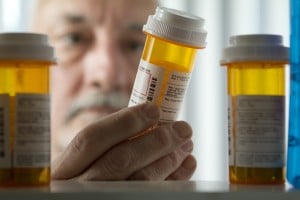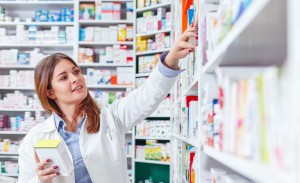Can You Trust An Online Pharmacy?
For every £5 we spend in the UK, one pound is spent online.
You may be wishing to, or have already, purchased medication online for yourself or your family. However, with high profile celebrities, such as Anthony McPartlin, falling victim to unethical online medicine sales, and with data from Interpol showing that more than half of medical products bought online are fake or unlicensed, it is no wonder that you may think twice before making an online medicine purchase.
In this article, we will help you to recognize when online pharmacies are trading legally and safely to help you make the right decisions when purchasing medicines online, for yourself and your loved ones.
What is an Online Pharmacy?
The correct term for an ‘online pharmacy’ is a distance selling pharmacy. However, you may hear them referred to by many other names, such as internet pharmacies, cyberpharmacies, and ePharmacies.
Online pharmacies have been present in the UK since November of 1999, and in April 2015 there were 496 websites attached to 453 pharmacy premises in the UK.
Online pharmacies can supply medicines from an NHS or private prescription, those that require a prescription are classed as Prescription Only Medicines (see table 1). They can also sell a range of over the counter medicines, classed as either General Sales List or Pharmacy medicines, which do not require a prescription (see table 1). Other items sold in online pharmacies are generally classified as beauty products. The benefits of online pharmacies for patients like yourself include; ease of access, convenience, and increased choice. You are also able to access the services with greater privacy and may benefit from the cheaper costs of online medicines.
For a pharmacy to be registered in the UK as an online pharmacy, there are certain criteria which they must meet. These criteria include that there must be no face to face contact between patients and the pharmacy staff in the delivery of essential services. The term ‘essential services’ refers to the pharmacy’s contract with the NHS to dispense medication from NHS prescriptions, along with other services such as dispensing appliances, repeat dispensing, clinical governance, public health promotion, disposal of unwanted medicines, signposting and supporting self-care. In order to secure a contract with the NHS, the online pharmacy will have to prove that they will comply with distance selling rules. UK registered online pharmacies must be willing to supply and deliver medicines against a valid prescription to anyone in the UK.
| Table 1 | General Sales List (GSL) | Pharmacy Medicines (P) | Prescription Only Medicines (POM) |
| Legislated by | Section 51 Medicines Act 1968 | Article 1 of Medicines (Pharmacy and General Sale Exemption) Order 1980 | Article 3 of Prescription Only Medicine (Human Use) Order 1997 |
| Controls and restrictions | Can be sold in regulated pharmacies without the supervision of a pharmacist, and other retail outlets that can close to exclude the public | Can only be sold or supplied from a registered pharmacy under the supervision of a pharmacist. Only applies to medicines for human use. |
Can only be sold or supplied from registered pharmacies under the supervision of a pharmacist with a valid prescription. Maybe a POM because of its marketing authorisation (product licence) or due to it being listed in POM (Human Use Order) 1997. |
How are Online Pharmacies Regulated?
UK registered online pharmacies are strictly regulated and must adhere to the same high standards as a ‘bricks and mortar’ pharmacy.
In the UK, online pharmacies are controlled centrally by the government, which sets out standards and policy.
The General Medical Council (GMC) and General Pharmaceutical Council (GPhC) are then licensed to self-regulate following these standards and policies. All UK doctors must be registered with the GMC, and all UK pharmacists must be registered with the GPhC. Section 58 of the Medicines Act 1968 (as amended) states that it is illegal to supply prescription drugs except through a registered pharmacist with a prescription issued by an appropriate prescriber. This means that prescriptions can only be dispensed if they have been issued by a registered prescriber and the dispensing can only be performed by a qualified dispenser and checked by a registered pharmacist. Consequently, both pharmacists and doctors are subject to regulatory control by both government bodies and professional organisations, whether they are operating in traditional ‘bricks and mortar’ premises or online. The medicine that pharmacists supply are also subject to strict controls. A UK pharmacy can only legally sell pharmaceutical products licensed by the MHRA (Medicines and Healthcare Products Regulatory Agency), this means that the drugs supplied by UK pharmacies must conform to strict safety and quality regulations.
Some online pharmacies offer services where they can both prescribe and dispense a medication for you. In this scenario, UK medical guidance provided by the GMC must be followed to ensure that the prescribing remains safe and effective. If the GMC guidelines are not fulfilled by an online consultation the doctor is advised not to prescribe. Briefly, the process which the doctor is advised to follow is to initially provide you with the details of the process of remote consultations and give you their name and GMC registration number. They should then check information about your symptoms and medical history using a questionnaire. If they make the decision to prescribe for you, they should ensure that they make arrangements to follow your progress and monitor the effectiveness of your treatment. They are also advised to inform your General Practitioner of their findings and the treatment that they have prescribed.
Online pharmacies in the UK must follow the same rules to protect your personal data as ‘bricks and mortar’ pharmacies, in line with the Data Protection Act 1985 and the new GDPR regulations. GDPR stands for General Data Protection Regulation and will come into force in the EU on 25th May 2018. The aim of GDPR is to protect all EU citizens from privacy and data breaches. Under this regulation, pharmacy owners will be classed as data ‘controllers’, and must be clear about the legal basis for all aspects of processing patient data including collecting, recording, retrieving, consulting and using data. As a result of the regulation, when breaches occur, fines will be imposed taking into account the kind of data protection breach that has occurred, the impact of the breach and whether there was intent behind the breach. Under the Pharmaceutical and Local Pharmaceutical Service Regulations 2013, pharmacies must also comply with NHS England’s data protection requirements and may be required to notify the GPhC and the police in the event of certain types of data breaches.
UK online pharmacies must not advertise prescription-only medicines to the public since it is illegal as a result of the Medicines (Advertising) Regulations 1994 as amended.
If you are wishing to purchase medication online, the laws in the UK mean that you can import medicinal products from abroad, for personal or family use, without a licence, with the exception of certain controlled drugs. However, if choosing to purchase medication online from non-UK registered pharmacies, it is important that you perform thorough investigations to ensure the site is acting legally in the country from which it operates and that it is appropriately regulated. Some websites will use a ‘trick’ known as ‘regulatory arbitrage’. Put simply, this is where the website is deliberately based in a country with the least effective regulatory framework. In this scenario it really is buyer beware.
What are the risks of ‘Illegally’ operating Online Pharmacies?
Neal Patel a spokesperson for the Royal Pharmaceutical Society (RPS) stated:
’There is potentially a huge risk with buying prescription medicines from unregulated illegal websites. Most of these will be fake, substandard or unapproved.’
So what have these ‘unregulated illegal websites’ been responsible for? They have been found to be carrying out illegal acts including selling prescription drugs without a legally valid private prescription and selling fake or poor quality drugs. Other concerns include directly advertising prescription-only medicines to UK consumers, not following data protection laws adequately and non-delivery of items purchased online. There have also been concerns over the quality of the online consultations intended to prescribe medication over the internet. Where poor quality consultations have taken place, there are considerable risks such as misdiagnosis, drug interactions with a patient’s pre-existing medication, and even a doctor not being the one to review the patient questionnaire.
In 2003 the National Audit Office found that 1% of the members of the public it surveyed had bought medication off the internet without a prescription for conditions including obesity, prostate cancer, hair loss and erectile dysfunction. This is a worrying statistic as it is vital to screen patients for their suitability for medicine. This needs to be done by a prescriber who is clinically trained to safely prescribe medicine.
As was referred to by Neal Patel, fake medication is one of the major risks of online purchases. In 2004, Pfizer (the manufacturer of Viagra) found 350000 websites either selling fake Viagra or directing users to websites that sell fake Viagra. Fake products can also be known as SSFFC products. This acronym stands for Substandard, Spurious, Falsely Labelled, Falsified and Counterfeit Medicines. Since 2013, the World Health Organisation (WHO) has asked member states to report SSFFC incidents. From 2013 to 2016 there were over 1114 reported incidents. Although SSFFC products are not limited to the internet, the majority are purchased on this platform.
Due to the existence of so many ‘fake’ medicines, the EU is fighting back. On the 9th February 2019, a new system to protect your safety will go live across Europe. This system is known as the ‘Falsified Medicines Directive’ (FMD). The aim of FMD is to provide a secure supply chain from manufacturers to wholesale medicines supplier, to the pharmacies that dispense medication, and ultimately to patients. In the UK, the MHRA is responsible for putting FMD into UK law. A National Medication Verification System (NMVS) will be connected to a central European hub. Each time a medicine is manufactured, a unique barcode will be added, along with anti-tamper packaging. The medicine details will then be added to the NMVS. The medicine is then tracked from the manufacturer to the pharmacy via the unique barcode. At the point at which the pharmacist is ready to hand the medication over to the patient, the barcode is scanned to ensure the product is genuine and then upon verification, the pharmacist will decommission and supply the medication. The barcode will also be decommissioned (essentially rendering it inactive). If an SSFFC product is identified this will trigger an alert due to its ‘fake’ barcode.
Only legitimate pharmacies, online or otherwise, will have access to this sophisticated technology to protect you. So how can you double check that the online pharmacy that you have chosen is legitimate? Read on…
Can you trust an online pharmacy?
‘Over 2 million people across Britain now regularly purchase medicines via the web, but almost one third do not know about online regulations’
Do not be part of this third. The regulations are designed to keep you safe. Without knowing that a site is properly regulated you cannot be sure that medicines have been properly prescribed for you. The medicines may not have received adequate checks to ensure their quality or effectiveness, and there also may be no legal recourse in the event of problems.
To dispense prescription-only medication, a pharmacy must receive a legally valid prescription. This can either be an electronic copy (via the NHS Electronic Prescription Service) or a paper copy which they may receive via the post (an email of the original is not sufficient). Where sites offer online consultation services to create a prescription prior to dispensing, the GMC offers protection by prosecuting for inappropriate prescribing.
As of the 1st July 2015 in the UK, anyone selling medicines to the public via a website needs to be
1) registered with the MHRA
2) be on the MHRA list of UK registered online sellers. The register is available at the following web address https://medicine-seller-register.mhra.gov.uk/
3) display the EU common logo on every page offering medicine for sale.
The EU common logo will once clicked, take you to an approved list of sellers on the MHRA website.
The GPhC operates a voluntary pharmacy logo scheme to help with the identification of legitimate online pharmacies. The aim of the pharmacy logo scheme is to provide additional peace of mind that an online pharmacy website is operating legitimately. When the pharmacy logo is clicked it will take you to the GPhC register showing an entry for the pharmacy whose site you are visiting.
You should also check the registration status of the pharmacist behind the site and look for the name and look for the name and address of the pharmacy operating the website.11 These can be verified against details stored on the GPhC website. You can access the GPhC register for registered pharmacies and pharmacists at the following web address:
https://www.pharmacyregulation.org/registers
What is the role of a pharmacist in protecting your safety?
Pharmacists are registered healthcare professionals, regulated by the General Pharmaceutical Council (GPhC). Since 2001, in order for a pharmacy student to qualify as a pharmacist, they must spend four years studying at University to achieve a Master’s degree in their subject. Before they can register with the GPhC, they must spend a further year working under the supervision of a more senior pharmacist, in what is known as a pre-registration year. A qualified pharmacist registered with the GPhC is responsible for ensuring the quality of the medication you receive from a pharmacy, and that the medication supply meets all legal regulations. They also check that the medication that the prescriber has selected for you is suitable by checking dosages, drug interactions and the indication for the medication. When supplying your medication, pharmacists are also able to provide you with advice about how best to take the medication, offer advice on side effects and how to manage them, along with answer any other queries you may have.
Safety Checklist
Being safe when making online medication purchases is essential for yourself and your loved ones. Always follow these NHS England recommended steps to ensure your safety online:
1) Always get medicines from a registered pharmacy
2) Never take a prescription medication without a valid prescription
3) Beware of spam emails advertising cheap medicines
4) Look for the Internet Pharmacy Logo
5) Check the registration status of the pharmacist as well as the name and address of the internet pharmacy
Lots of useful resources are also provided by the MHRA including the #FakeMedicines twitter campaign. The #FakeMedicines twitter campaign is aimed at 18-30-year-olds, and aims to educate people about the risks of taking fake medication, and how to avoid buying fake medicines online. As part of this campaign, the MHRA linked up with the popular soap Coronation Street. This collaboration resulted in Coronation Street running a storyline where the character Bethany Platt collapsed after purchasing fake diet pills online. You also have the ability to report suspicious medicines and websites by contacting the MHRA. If you wish to contact the MHRA to report anything suspicious, their contact details are as follows:
Telephone 02030806844
Website http://medicine-seller-register.mhra.gov.uk/report
Email [email protected]
References
https://www.ons.gov.uk/businessindustryandtrade/retailindustry/bulletins/retailsales/december2017 Accessed: 21/4/18
www.pharmaceutical-journal.com/your-rps/beware-of-illegal-online-pharmacies-when-buying-prescription-only-medicines/20203472.article Accessed: 2/4/18
https://pharmacyregulation.org/regulate/article/help-mhra-educate-patients-about-buying-medicines-safely-online Accessed: 6/4/18
www.pharmaceutical-journal.com/career/career-feature/advice-rules-and-regulations-for-setting-up-an-internet-pharmacy/20068262.article Accessed: 2/4/18
https://www.herts.ac.uk/_data/assets/pdf_file/0008/38663/HIJ_V4I1_George.pdf Accessed: 6/4/18
www.psnc.org.uk/services-commissioning/essential-services/ Accessed: 18/4/18
https://www.pharmacyregulation.org/registration/internet-pharmacy Accessed: 6/4/18
https://www.gov.uk/check-medicines-online Accessed: 6/4/18
www.pharmaceutical-journal.com/news-and-analysis/news-in-brief/counterfeit-medicines-are-a-growing-threat-to-global-health-who-meeting-hears/20201237.article Accessed 2/4/18
www.pharmaceutical-journal.com/news-and-analysis/features/falsified-medicines-directive-opportunity-or-obstacle/20202646.article Accessed: 2/4/18
www.pharmaceutical-journal.com/news-and-analysis/news/internet-pharmacy-logo-adds-credibility/10005793.article Accessed: 2/4/18
https://www.nhs.uk/NHSEngland/AboutNHSservices/pharmacists/Pages/internet-drugs.aspx Accessed: 6/4/18
https://pharmacyregulation.org/regulate/article/new-requirements-websites-selling-medicines-uk Accessed: 6/4/18
www.pharmacyregulation.org/sites/default/files/Historic%20qualifications%20g.pdf Accessed: 18/4/18
https://www.gov.uk/government/news/dodgy-diet-pills-dying-to-lose-weight Accessed 18/4/18
https://medicine-seller-register.mhra.gov.uk Accessed: 6/4/18
Assured Pharmacy is not liable for the currency or accuracy of the information contained in this blog post. For specific information about your personal medical condition, please contact our doctors or pharmacists for advice on [email protected]





